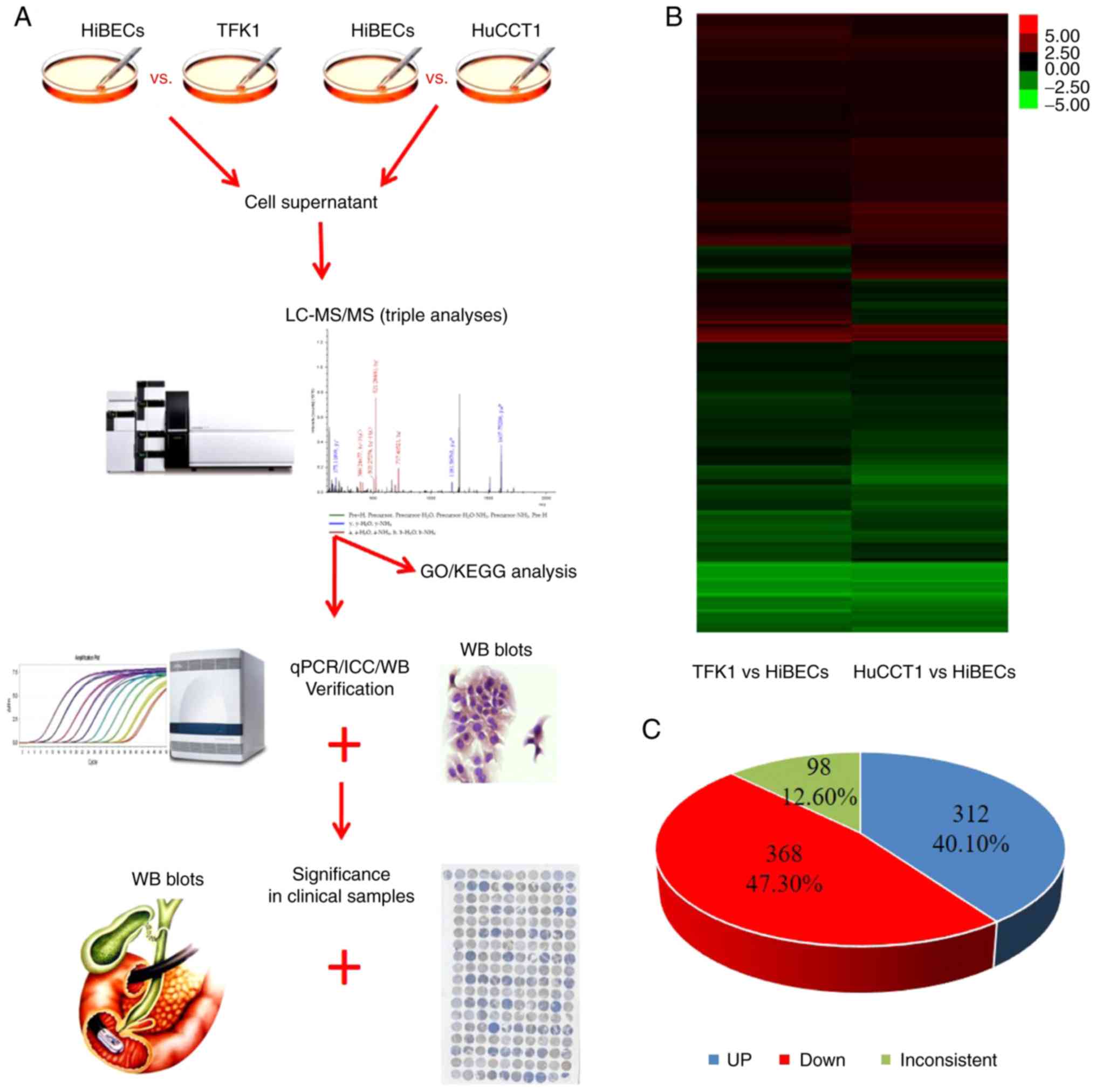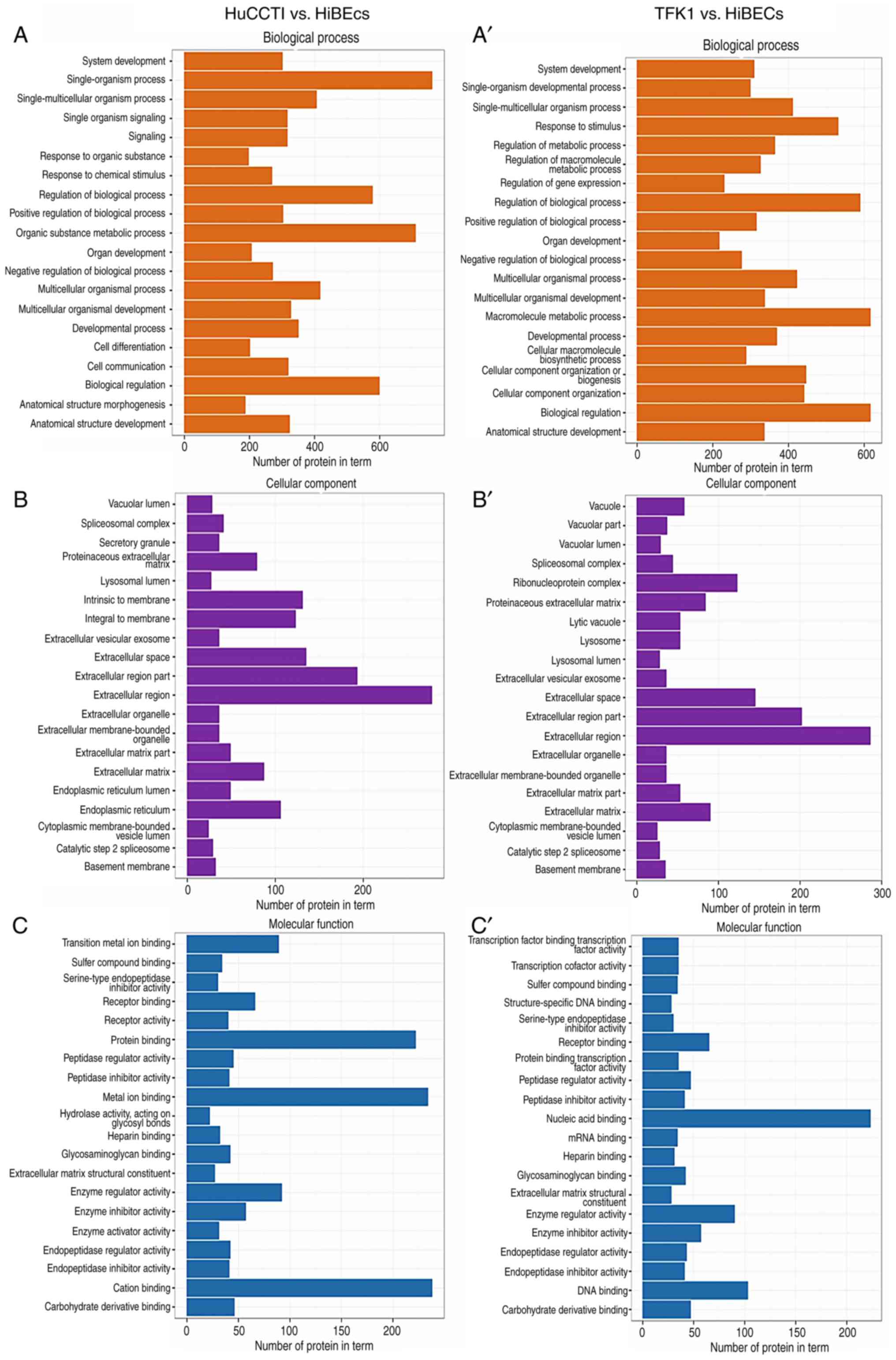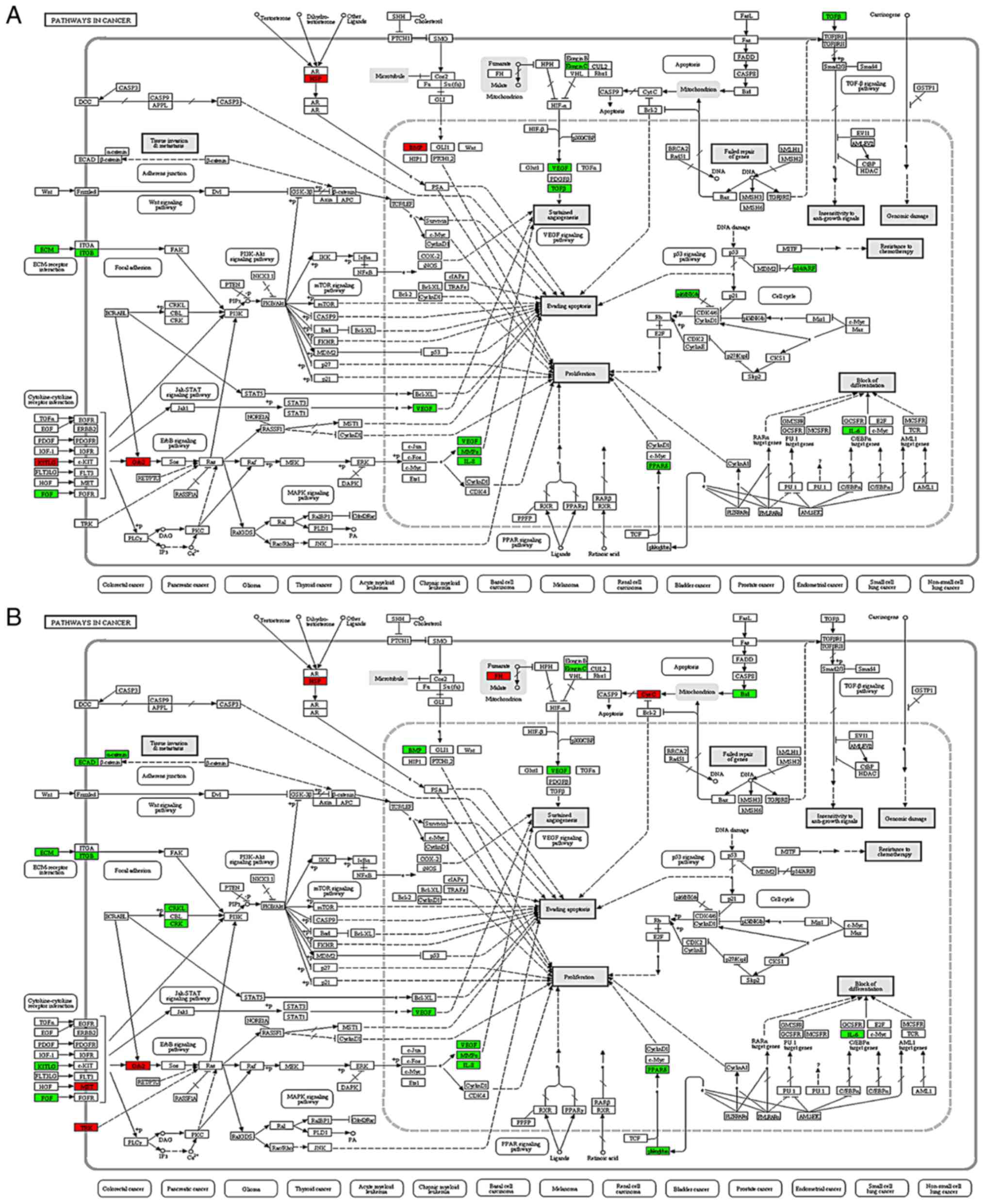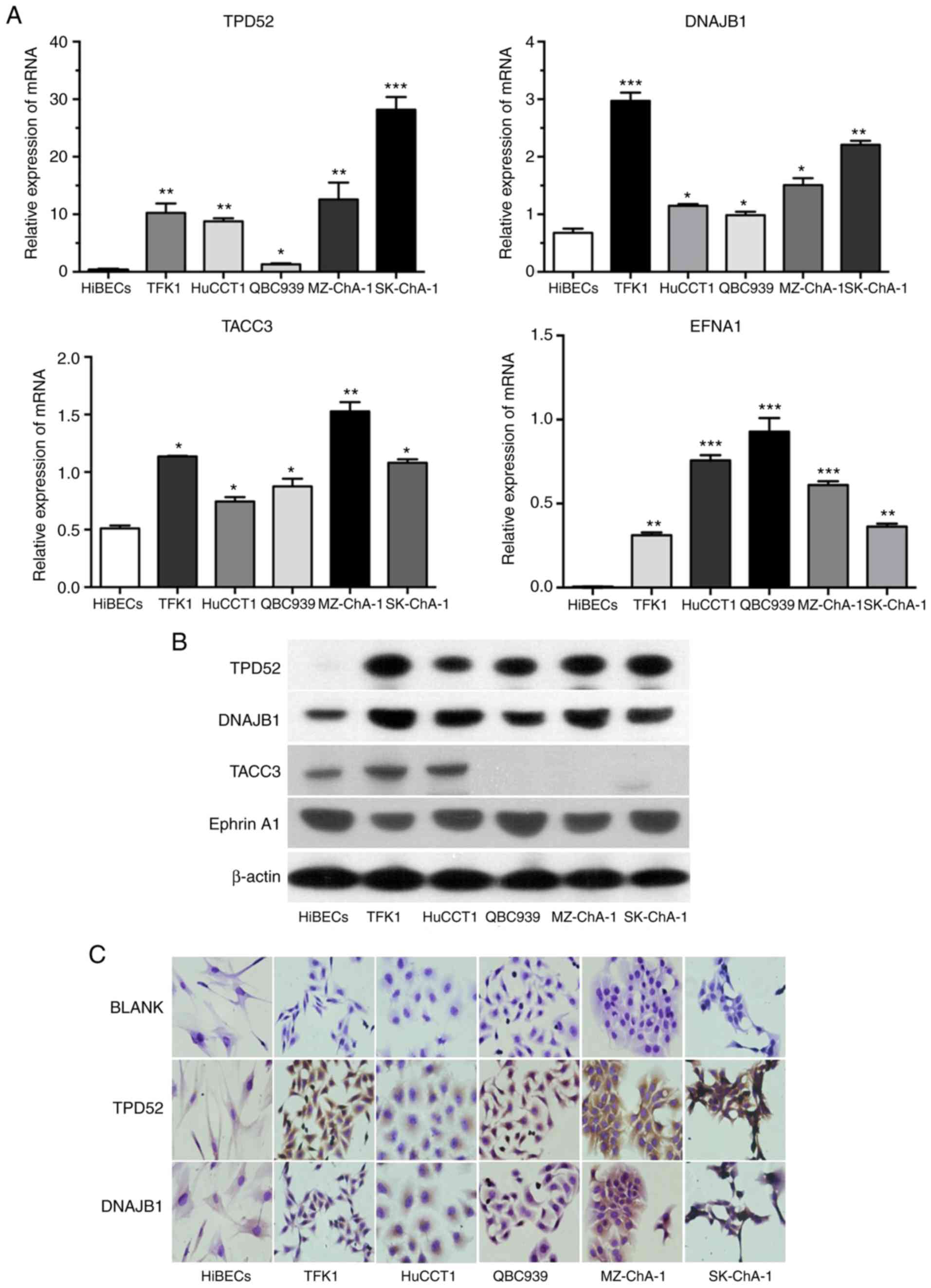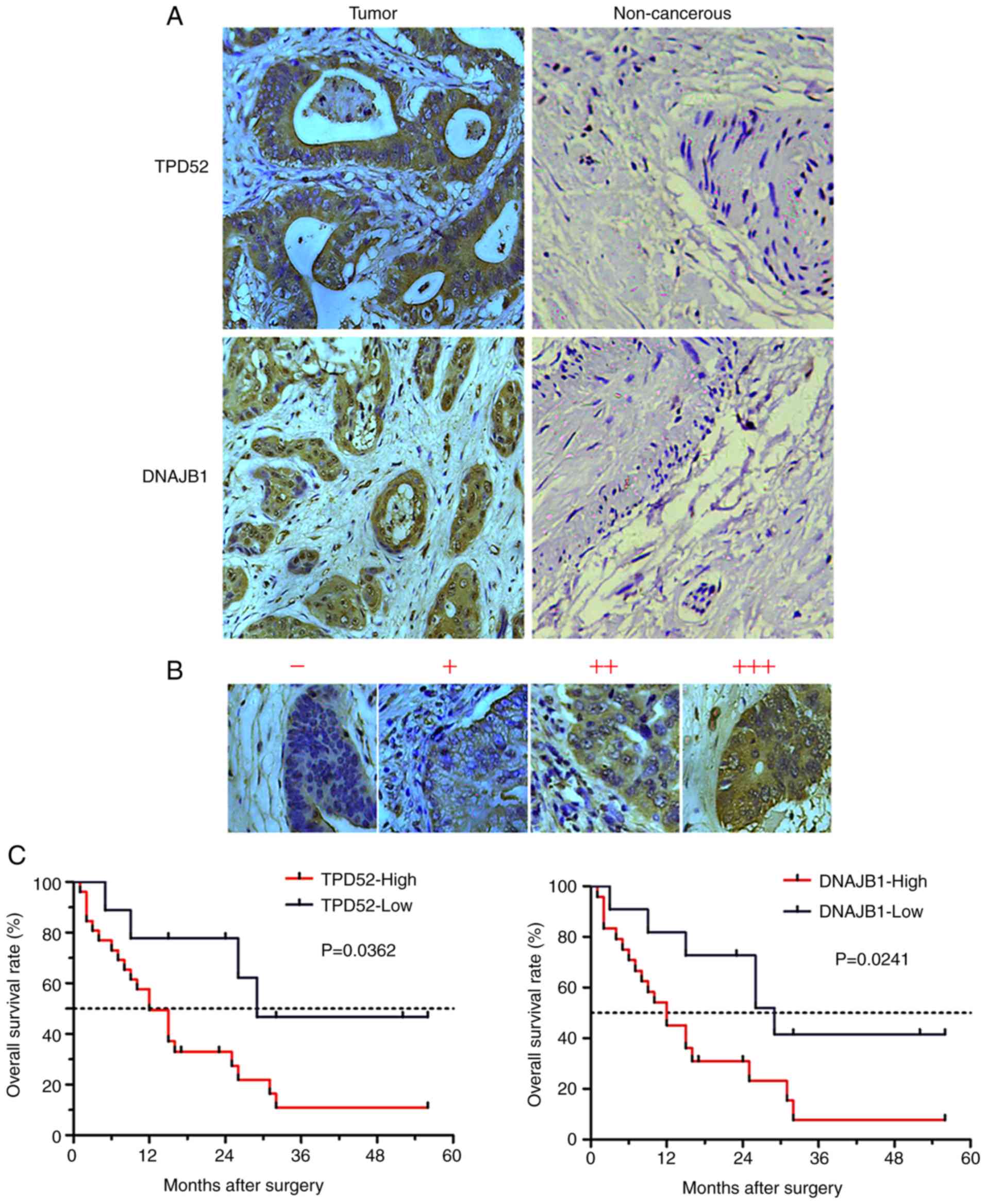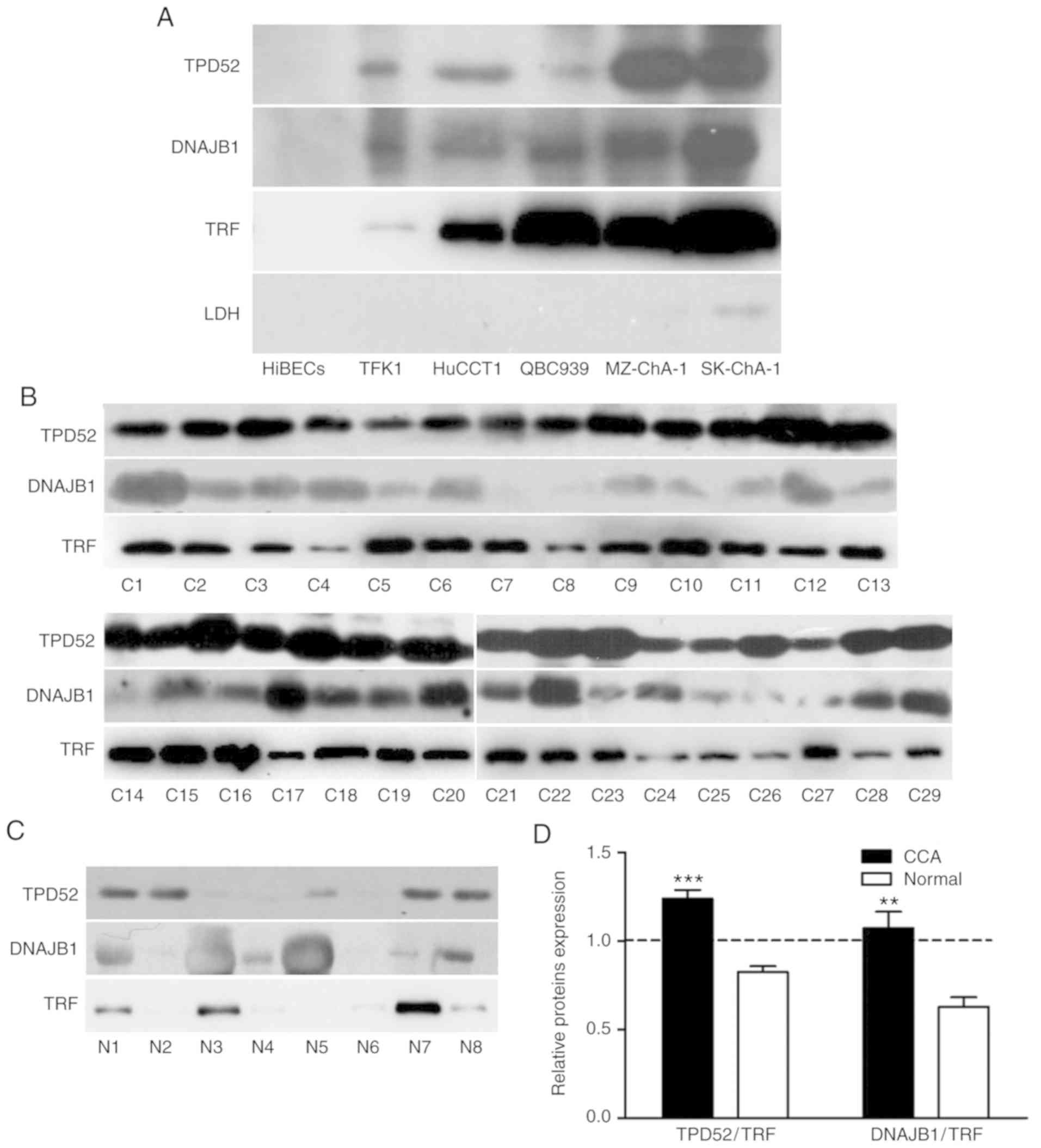|
1
|
Banales JM, Cardinale V, Carpino G,
Marzioni M, Andersen JB, Invernizzi P, Lind GE, Folseraas T, Forbes
SJ, Fouassier L, et al: Expert consensus document:
Cholangiocarcinoma: Current knowledge and future perspectives
consensus statement from the european network for the study of
cholangiocarcinoma (ENS-CCA). Nat Rev Gastroenterol Hepatol.
13:261–280. 2016. View Article : Google Scholar : PubMed/NCBI
|
|
2
|
Razumilava N and Gores GJ:
Cholangiocarcinoma. Lancet. 383:2168–2179. 2014. View Article : Google Scholar : PubMed/NCBI
|
|
3
|
Qian Y, Yao W, Yang T, Yang Y, Liu Y, Shen
Q, Zhang J, Qi W and Wang J: aPKC-ι/P-Sp1/Snail signaling induces
epithelial-mesenchymal transition and immunosuppression in
cholangiocarcinoma. Hepatology. 66:1165–1182. 2017. View Article : Google Scholar : PubMed/NCBI
|
|
4
|
Zhang W and Yan LN: Perihilar
cholangiocarcinoma: Current therapy. World J Gastrointest
Pathophysiol. 5:344–354. 2014. View Article : Google Scholar : PubMed/NCBI
|
|
5
|
Khan SA, Davidson BR, Goldin RD, Heaton N,
Karani J, Pereira SP, Rosenberg WM, Tait P, Taylor-Robinson SD,
Thillainayagam AV, et al: Guidelines for the diagnosis and
treatment of cholangiocarcinoma: An update. Gut. 61:1657–1669.
2012. View Article : Google Scholar : PubMed/NCBI
|
|
6
|
Coelho R, Silva M, Rodrigues-Pinto E,
Cardoso H, Lopes S, Pereira P, Vilas-Boas F, Santos-Antunes J,
Costa-Maia J and Macedo G: CA 19-9 as a marker of survival and a
predictor of metastization in cholangiocarcinoma. GE Port J
Gastroenterol. 24:114–121. 2017. View Article : Google Scholar : PubMed/NCBI
|
|
7
|
Voigtländer T, Metzger J, Schönemeier B,
Jäger M, Mischak H, Manns M and Lankisch TO: A combined bile and
urine proteomic test for cholangiocarcinoma diagnosis in patients
with biliary strictures of unknown origin. United European
Gastroenterol J. 5:668–676. 2017. View Article : Google Scholar : PubMed/NCBI
|
|
8
|
Navaneethan U, Njei B, Lourdusamy V,
Konjeti R, Vargo JJ and Parsi MA: Comparative effectiveness of
biliary brush cytology and intraductal biopsy for detection of
malignant biliary strictures: A systematic review and
meta-analysis. Gastrointest Endosc. 81:168–176. 2015. View Article : Google Scholar : PubMed/NCBI
|
|
9
|
Melle C, Ernst G, Schimmel B, Bleul A,
Koscielny S, Wiesner A, Bogumil R, Möller U, Osterloh D, Halbhuber
KJ and von Eggeling F: A technical triade for proteomic
identification and characterization of cancer biomarkers. Cancer
Res. 64:4099–4104. 2004. View Article : Google Scholar : PubMed/NCBI
|
|
10
|
Ghosh D, Li Z, Tan XF, Lim TK, Mao Y and
Lin Q: iTRAQ based quantitative proteomics approach validated the
role of calcyclin binding protein (CacyBP) in promoting colorectal
cancer metastasis. Mol Cell Proteomics. 12:1865–1880. 2013.
View Article : Google Scholar : PubMed/NCBI
|
|
11
|
Qiao J, Fang CY, Chen SX, Wang XQ, Cui SJ,
Liu XH, Jiang YH, Wang J, Zhang Y, Yang PY and Liu F: Stroma
derived COL6A3 is a potential prognosis marker of colorectal
carcinoma revealed by quantitative proteomics. Oncotarget.
6:29929–29946. 2015. View Article : Google Scholar : PubMed/NCBI
|
|
12
|
Ross PL, Huang YN, Marchese JN, Williamson
B, Parker K, Hattan S, Khainovski N, Pillai S, Dey S, Daniels S, et
al: Multiplexed protein quantitation in saccharomyces cerevisiae
using amine-reactive isobaric tagging reagents. Mol Cell
Proteomics. 3:1154–1169. 2004. View Article : Google Scholar : PubMed/NCBI
|
|
13
|
Huang GL, Luo Q, Rui G, Zhang W, Zhang QY,
Chen QX and Shen DY: Oncogenic activity of retinoic acid receptor γ
is exhibited through activation of the Akt/NF-κB and Wnt/β-catenin
pathways in cholangiocarcinoma. Mol Cell Biol. 33:3416–3425. 2013.
View Article : Google Scholar : PubMed/NCBI
|
|
14
|
Livak KJ and Schmittgen TD: Analysis of
relative gene expression data using real-time quantitative PCR and
the 2(-Delta Delta C(T)) method. Methods. 25:402–408. 2001.
View Article : Google Scholar : PubMed/NCBI
|
|
15
|
Silsirivanit A, Sawanyawisuth K, Riggins
GJ and Wongkham C: Cancer biomarker discovery for
cholangiocarcinoma: The high-throughput approaches. J Hepatobiliary
Pancreat Sci. 21:388–396. 2014. View
Article : Google Scholar : PubMed/NCBI
|
|
16
|
Phoomak C, Park D, Silsirivanit A,
Sawanyawisuth K, Vaeteewoottacharn K, Detarya M, Wongkham C,
Lebrilla CB and Wongkham S: O-GlcNAc-induced nuclear translocation
of hnRNP-K is associated with progression and metastasis of
cholangiocarcinoma. Mol Oncol. 13:338–357. 2019. View Article : Google Scholar : PubMed/NCBI
|
|
17
|
Kristiansen TZ, Harsha HC, Grønborg M,
Maitra A and Pandey A: Differential membrane proteomics using
18O-labeling to identify biomarkers for cholangiocarcinoma. J
Proteome Res. 7:4670–4677. 2008. View Article : Google Scholar : PubMed/NCBI
|
|
18
|
Perdomo J, Leung HHL, Ahmadi Z, Yan F,
Chong JJH, Passam FH and Chong BH: Neutrophil activation and
NETosis are the major drivers of thrombosis in heparin-induced
thrombocytopenia. Nat Commun. 10:13222019. View Article : Google Scholar : PubMed/NCBI
|
|
19
|
Boutros R, Fanayan S, Shehata M and Byrne
JA: The tumor protein D52 family: Many pieces, many puzzles.
Biochem Biophys Res Commun. 325:1115–1121. 2004. View Article : Google Scholar : PubMed/NCBI
|
|
20
|
Byrne JA, Tomasetto C, Garnier JM, Rouyer
N, Mattei MG, Bellocq JP, Rio MC and Basset P: A screening method
to identify genes commonly overexpressed in carcinomas and the
identification of a novel complementary DNA sequence. Cancer Res.
55:2896–2903. 1995.PubMed/NCBI
|
|
21
|
Kumamoto T, Seki N, Mataki H, Mizuno K,
Kamikawaji K, Samukawa T, Koshizuka K, Goto Y and Inoue H:
Regulation of TPD52 by antitumor microRNA-218 suppresses cancer
cell migration and invasion in lung squamous cell carcinoma. Int J
Oncol. 49:1870–1880. 2016. View Article : Google Scholar : PubMed/NCBI
|
|
22
|
Li J, Li Y, Liu H, Liu Y and Cui B: The
four-transmembrane protein MAL2 and tumor protein D52 (TPD52) are
highly expressed in colorectal cancer and correlated with poor
prognosis. PLoS One. 12:e01785152017. View Article : Google Scholar : PubMed/NCBI
|
|
23
|
Alagaratnam S, Hardy JR, Lothe RA,
Skotheim RI and Byrne JA: TPD52, a candidate gene from genomic
studies, is overexpressed in testicular germ cell tumours. Mol Cell
Endocrinol. 306:75–80. 2009. View Article : Google Scholar : PubMed/NCBI
|
|
24
|
Rubin MA, Varambally S, Beroukhim R,
Tomlins SA, Rhodes DR, Paris PL, Hofer MD, Storz-Schweizer M,
Kuefer R, Fletcher JA, et al: Overexpression, amplification, and
androgen regulation of TPD52 in prostate cancer. Cancer Res.
64:3814–3822. 2004. View Article : Google Scholar : PubMed/NCBI
|
|
25
|
Byrne JA, Maleki S, Hardy JR, Gloss BS,
Murali R, Scurry JP, Fanayan S, Emmanuel C, Hacker NF, Sutherland
RL, et al: MAL2 and tumor protein D52 (TPD52) are frequently
overexpressed in ovarian carcinoma, but differentially associated
with histological subtype and patient outcome. BMC Cancer.
10:4972010. View Article : Google Scholar : PubMed/NCBI
|
|
26
|
Goto Y, Nishikawa R, Kojima S, Chiyomaru
T, Enokida H, Inoguchi S, Kinoshita T, Fuse M, Sakamoto S, Nakagawa
M, et al: Tumour-suppressive microRNA-224 inhibits cancer cell
migration and invasion via targeting oncogenic TPD52 in prostate
cancer. FEBS Lett. 588:1973–1982. 2014. View Article : Google Scholar : PubMed/NCBI
|
|
27
|
Yamazaki S, Uchiumi A and Katagata Y:
Hsp40 regulates the amount of keratin proteins via
ubiquitin-proteasome pathway in cultured human cells. Int J Mol
Med. 29:165–168. 2012.PubMed/NCBI
|
|
28
|
Lenna S, Farina AG, Martyanov V,
Christmann RB, Wood TA, Farber HW, Scorza R, Whitfield ML, Lafyatis
R and Trojanowska M: Increased expression of endoplasmic reticulum
stress and unfolded protein response genes in peripheral blood
mononuclear cells from patients with limited cutaneous systemic
sclerosis and pulmonary arterial hypertension. Arthritis Rheum.
65:1357–1366. 2013. View Article : Google Scholar : PubMed/NCBI
|
|
29
|
Batra J, Tripathi S, Kumar A, Katz JM, Cox
NJ, Lal RB, Sambhara S and Lal SK: Human heat shock protein 40
(Hsp40/DnaJB1) promotes influenza A virus replication by assisting
nuclear import of viral ribonucleoproteins. Sci Rep. 6:190632016.
View Article : Google Scholar : PubMed/NCBI
|
|
30
|
Honeyman JN, Simon EP, Robine N,
Chiaroni-Clarke R, Darcy DG, Lim II, Gleason CE, Murphy JM,
Rosenberg BR, Teegan L, et al: Detection of a recurrent
DNAJB1-PRKACA chimeric transcript in fibrolamellar hepatocellular
carcinoma. Science. 343:1010–1014. 2014. View Article : Google Scholar : PubMed/NCBI
|
|
31
|
Park SY, Choi HK, Seo JS, Yoo JY, Jeong
JW, Choi Y, Choi KC and Yoon HG: DNAJB1 negatively regulates MIG6
to promote epidermal growth factor receptor signaling. Biochim
Biophys Acta. 1853:2722–2730. 2015. View Article : Google Scholar : PubMed/NCBI
|
|
32
|
Cui X, Choi HK, Choi YS, Park SY, Sung GJ,
Lee YH, Lee J, Jun WJ, Kim K, Choi KC and Yoon HG: DNAJB1
destabilizes PDCD5 to suppress p53-mediated apoptosis. Cancer Lett.
357:307–315. 2015. View Article : Google Scholar : PubMed/NCBI
|
|
33
|
Rose JB, Correa-Gallego C, Li Y, Nelson J,
Alseidi A, Helton WS, Allen PJ, D'Angelica MI, DeMatteo RP, Fong Y,
et al: The role of biliary carcinoembryonic antigen-related
cellular adhesion molecule 6 (CEACAM6) as a biomarker in
cholangiocarcinoma. PLoS One. 11:e01501952016. View Article : Google Scholar : PubMed/NCBI
|















